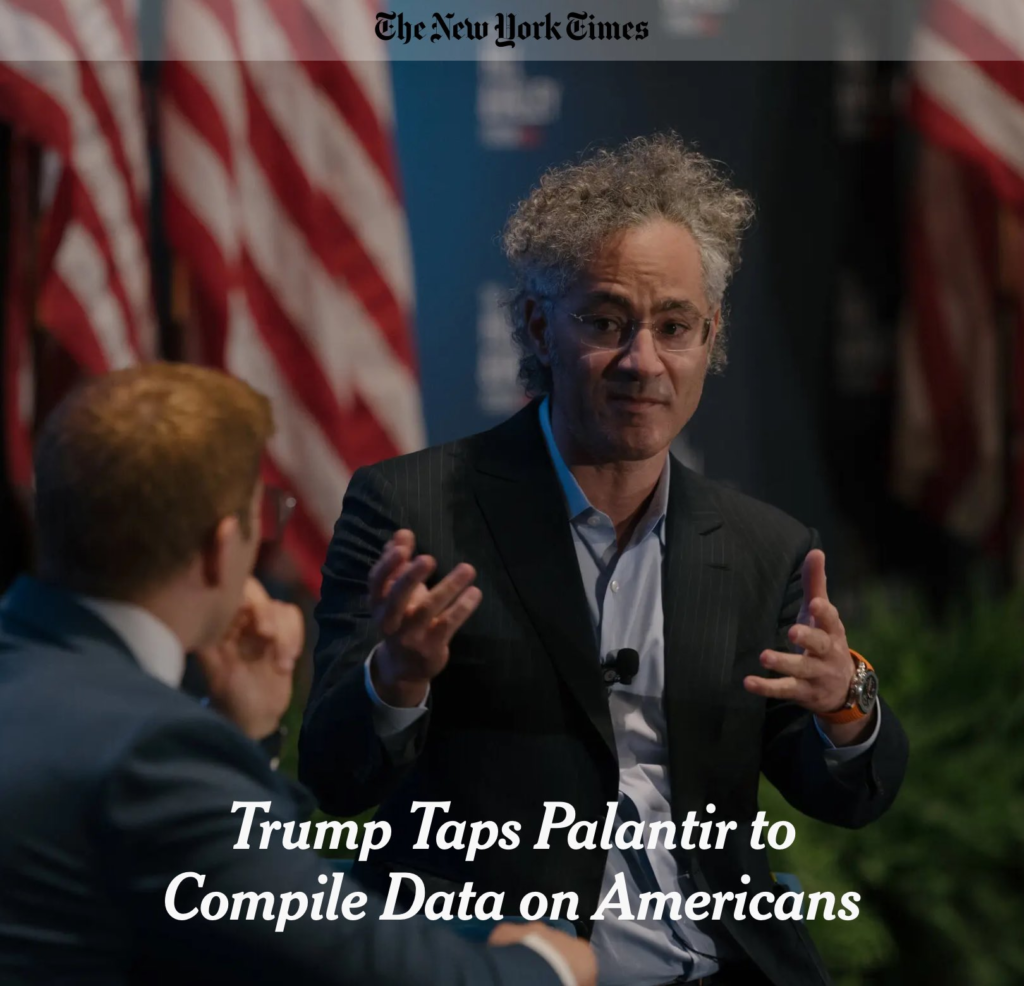
In a move that’s stirring both excitement and unease, the Trump administration has deepened its partnership with Palantir Technologies, a data analytics giant, to centralize vast amounts of federal data. This initiative, driven by an executive order signed in March 2025, aims to streamline government operations by linking sensitive records from agencies like the IRS, Social Security Administration, and Department of Homeland Security. While the plan promises efficiency and fraud detection, it’s raising serious concerns about privacy, surveillance, and the potential misuse of Americans’ personal information. Here’s what you need to know about this controversial development.
What’s Happening with Palantir and the Trump Administration?
The Trump administration has tapped Palantir to build a powerful data platform that connects records from multiple federal agencies. Palantir’s Foundry platform, which organizes and analyzes massive datasets, is already in use at four agencies, including the Department of Homeland Security (DHS) and the Department of Health and Human Services (HHS). The company has secured over $113 million in federal contracts since Trump took office, with a recent $795 million Department of Defense deal pushing its role even further. Discussions are also underway with the IRS and Social Security Administration to expand Palantir’s reach.
This push stems from an executive order Trump signed in March 2025, calling for federal agencies to share data more effectively. The goal, according to the White House, is to cut costs, reduce fraud, and boost efficiency. Palantir’s technology, particularly its Foundry and Gotham platforms, is designed to merge and analyze data, creating a centralized system that could provide detailed profiles on millions of Americans. For example, the Gotham software is being used to flag fraud and track behavior, while Foundry helps agencies like the IRS build searchable taxpayer databases.
The partnership has also caught Wall Street’s attention. Palantir’s stock has surged over 140% since Trump’s re-election, reflecting investor confidence in the company’s growing role as the backbone of federal data operations. But while investors cheer, privacy advocates and even some Palantir employees are sounding the alarm.
Why Privacy Advocates Are Worried
The idea of a centralized database containing Americans’ personal information—tax records, immigration details, Social Security data, and more—has sparked widespread concern. Privacy experts warn that such a system could become a surveillance powerhouse, giving the government unprecedented access to detailed profiles on citizens. Critics argue this could be used to target specific groups, like immigrants or political opponents, especially given Palantir’s history of working with agencies like Immigration and Customs Enforcement (ICE).
The Department of Government Efficiency (DOGE), led by Elon Musk, has played a key role in selecting Palantir for this initiative. However, reports suggest DOGE has been lax with data security protocols, heightening fears of misuse. Privacy and immigrant rights groups have filed lawsuits challenging the administration’s plans, arguing that repurposing data originally collected for public services could erode public trust. As one privacy advocate put it, “Combining extensive datasets raises the risk of misuse, especially when the system is controlled by an administration with a track record of pushing boundaries.”
Palantir has tried to address these concerns, stating it acts only as a “data processor” and not a “data controller.” In a company blog post, Palantir emphasized that its clients—government agencies—decide how the data is used. But critics argue this distinction does little to ease worries when the technology itself enables such powerful data integration.
Internal Dissent at Palantir
The controversy isn’t just external. Inside Palantir, some employees are uneasy about the company’s growing role in the Trump administration’s data plans. Thirteen former employees recently signed an open letter urging Palantir to halt its work with the administration, citing risks of surveillance overreach and reputational damage. Brianna Katherine Martin, a former Palantir strategist, publicly announced her departure on LinkedIn, calling the company’s expanded work with ICE a “red line” she wouldn’t cross. Current and former employees have also raised concerns about sloppy security practices by some government users, which could expose sensitive data to risks.

This internal unrest reflects a broader tension within the tech industry, where employees increasingly question the ethical implications of their work. Palantir’s leadership, led by CEO Alex Karp, has defended its government contracts, arguing that the technology serves critical purposes like fraud detection and national security. Yet the growing backlash suggests not everyone is convinced.
The Bigger Picture: Power and Accountability
At its core, this partnership raises questions about power and accountability. A centralized data system could streamline government operations, but it also concentrates immense control in the hands of those who oversee it. If misused, the system could evolve into a tool for political agendas, as critics fear. For example, combining immigration data with tax or Social Security records could make it easier to track and monitor specific populations, raising concerns about civil liberties.
The involvement of DOGE, with its ties to Palantir co-founder Peter Thiel and other Trump allies, adds another layer of complexity. Thiel, a longtime supporter of Trump, has positioned Palantir as a key player in government tech. This has led some to question whether the partnership prioritizes political loyalty over transparency and oversight.
On the flip side, supporters of the initiative argue that data centralization is a necessary step to modernize an outdated federal system. They point out that Palantir’s technology can help catch fraudsters, improve efficiency, and save taxpayer money. For instance, Palantir’s recent partnership with Fannie Mae to detect mortgage fraud shows how its AI tools can protect public resources. The White House has remained tight-lipped about specific details but insists the goal is to improve government operations, not to spy on citizens.
What’s Next for Palantir and Privacy?
As Palantir’s role expands, the debate over privacy and surveillance is unlikely to fade. Privacy advocates are pushing for stronger oversight and clear rules on how data can be used. Some are calling for Congress to step in and set boundaries to prevent abuse. Meanwhile, Palantir is likely to continue securing contracts, with potential deals at the IRS and Social Security Administration on the horizon.
For everyday Americans, the stakes are high. A centralized database could make government services more efficient, but it also raises the risk of data breaches or misuse. The question is whether the benefits outweigh the dangers—and whether the public will have a say in how their information is handled.
Why This Matters to You
This partnership affects more than just policy wonks or tech enthusiasts. It touches on fundamental questions about privacy, trust, and the role of technology in our lives. If you’re concerned about how your personal data is used, now is the time to pay attention. Reach out to your elected officials, stay informed, and consider supporting organizations advocating for stronger privacy protections.
For more details, check out these sources:
- The New York Times: Trump Taps Palantir to Compile Data on Americans
- The Economic Times: Palantir to Create Vast Federal Data Platform
- TechStory: Palantir’s Expanding Federal Role Under Trump Raises Alarms
The Trump-Palantir partnership is a bold step toward modernizing federal data systems, but it comes with serious risks. As the debate unfolds, one thing is clear: the balance between efficiency and privacy hangs in the balance, and the outcome will shape how the government interacts with its citizens for years to come.
Know More :- Supreme Court Allows Trump to Revoke Legal Status for 532,000 Migrants





